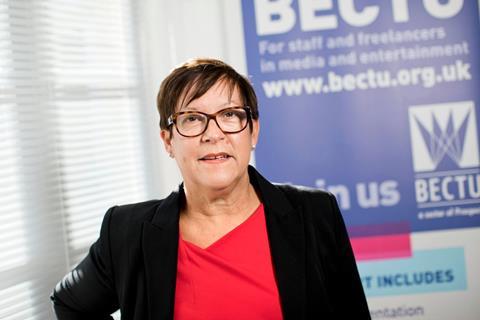
A clear majority of film and TV workers in the UK are out of work due to the US strikes, according to a survey by UK creative industries’ union, Bectu.
The union asked nearly 4,000 UK film and TV workers how the WGA and SAG-AFTRA strikes are impacting them.
It found three quarters of survey respondents are not working and 80% have seen their employment directly impacted by the US industrial disputes. Furthermore, nine out of 10 (90%) said they are worried about their financial security.
The full results of the report will be published later this week.
Just over a third of workers (35%) said they are struggling to pay household bills, rent or mortgages, while 15% have taken out a loan or other unsecured debt to pay their bills. A further one in 10 workers are considering moving in with their parents or other family to help with costs.
The results also exposed concerns around mental health and wellbeing, with six out of 10 saying they are struggling with their mental health as a result of loss of work and/ or financial worries.
Nearly a quarter of respondents said they did not see themselves working in the industry in the next five years.
The survey heard from several workers who shared troubling experiences, including from a woman who lost her job while pregnant.
“The loss of my job has put great stress and anxiety on my first pregnancy,” she said.
“I am so disheartened by the industry and how disposable we are to productions. We have not heard anything from the production since our last day of work in July.”
Another respondent said: “I don’t see myself continuing to work in this industry. Situations like this cause so much stress financially on top of the stress the industry can already have while you’re working…I know a lot of people living paycheck to paycheck.”
A third respondent said: “After being one of the forgotten many who fell through the cracks during the pandemic and received absolutely no financial support from the government, to now be in an even worse financial position is mind blowing and infuriating.”
Head of Bectu Philippa Childs had warned in July that a “perfect storm” was brewing for freelancers as the strikes exacerbate ongoing issues including high inflation, a drop in advertising revenue and a commissioning slowdown.
She said the impact on crew and other film and TV workers is “severe and cannot be underestimated” as members are laid off from productions under ‘force majeure’ clauses with little notice or pay.
“This is a workforce that has already faced incredible hardship throughout and following the pandemic, and has now been hit by a second crisis in just a few years,” she said.
“The number of freelancers questioning their future in the industry should sound alarm bells. For too long we have seen a pattern of engaging crew where they are picked up and dropped again with little notice, protection or reassurances about future employment. They are often the first to suffer and the hardest hit when production is impacted.”
Childs added: “The government is vocal about the huge cultural and economic value of the creative industries; it must put its money where its mouth is and look after those who work in the sector. Likewise urgent industry collaboration and commitment from employers to support the freelance workforce is critical if we want to UK to remain a cultural hub.”
Bectu hosted a webinar last month, in which SAG-AFTRA chief negotiator Duncan Crabtree-Ireland blamed studios union the AMPTP for the ongoing actors strike and slammed it for stalling on negotiations that could bring it to an end.
He thanked Bectu members for their solidarity and support for the strikes, saying: “I want to acknowledge the writers’ strike and our strike have significant economic consequences to people. The companies we are on strike against are global multinational corporations. They have operations around the world, and this is a fight that effects everybody, both for the good and for the bad.”
A version of this story originally appeared on Screen’s sister site, Broadcast.

























No comments yet